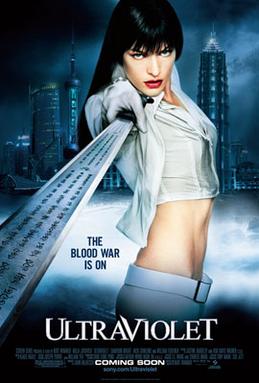Transhumanism is an international intellectual movement supporting the use of science and technology to improve human mental and physical characteristics and capacities. The movement regards aspects of the human condition, such as disability, suffering, disease, aging, and involuntary death as unnecessary and undesirable.
In other words, with the help of both science and tech nology, humans may be able to transform themselves into persons with such expanded abilities as to merit the label "posthuman."
nology, humans may be able to transform themselves into persons with such expanded abilities as to merit the label "posthuman."
Gattaca and Ultraviolet are two films which discuss the notion of transhumanism in great length, albeit in very different ways. Gattaca (1997), a movie which won both Best Film and Best Original Soundtrack in the Sitges-Catalonian International Film Festival, takes a very direct approach in bringing to light the troublesome debate of the genetic divide. Ultraviolet (2006), on the other hand, which I attribute almost entirely to its' weird comic book-y vibe, chooses the overplayed, slightly supernatural route and dumbs down its' transhumanistic debate by focusing less on the science, and more on the good-vs. evil debate. Still, questions of "What is human?" and "What is not?" are raised and somewhat answered.
Ultraviolet takes place in the year 2078, in the years following a global pandemic of a lab-engineered, blood-borne, highly infectious disease known as hemoglophagia. Those afflicted with the disease are referred to as "hemophages". The disease kills the infected within twelve years, but also gives them super-human abilities as well as elongated fang-like canine teeth, leading the media to call them vampires. Fear overwhelmed the population and led to the rise of the Arch-Ministry, a militant medical establishment which took control of the government and began rounding up and exterminating all infected citizens in order to contain the virus.
Due to virus' transformation of human body, Violet Song jat Shariff (Milla Jovovich), is now a ruthless killing machine with only days left to live due to her terminal-stage hemoglophagia. She is hired by an underground resistance movement of hemophages waging a guerrilla war against the Arch-Ministry. Infiltrating a government laboratory, Violet steals a weapon developed by the Arch-Ministry to exterminate all hemophages on the planet, only to discover the "weapon" is a child named "Six." Six is believed to be a carrier for cultured antigens developed to target hemophages, which Violet's employers want destroyed. Violet breaks ranks with the hemophages and flees with the boy, believing that a cure for the disease can be reverse-engineered from the antigens.
In Gattaca, Ethan Hawke is Vincent, an "In-Valid" or "faith-born" who becomes a
"borrowed-ladder" by assuming the identity of a genetically superior, but crippled man, Jerome (Jude Law), in order to fulfill his dream of space travel. In a world, where genetics, rather than race or social class, determine one's advancement in society, Vincent's dream is impossible without this fraud. A week shy of his launch date, his director is murdered and an errant eyelash may prove his downfall. Marked as a suspect, Vincent must now up his deception and evade both a relentless investigator and a beautiful college (Uma Thurman) in order to keep his mission.
Both these films ask and seem to answer the question of whether or not genetic engineering is positive for society with a resounding no. Gattaca makes it quite clear that it could create a two-tiered society of genetically-engineered "haves" and genetically inferior "have
nots," confering additional power upon the already powerful and wealthy. Ultraviolet warns of the consequences of genetic engineering for the purpose of "supering" the human race--society-wide fear of those considered less than human. And both films deal with the severe loss of rights and privacy in these new world systems.
But enough with the heavy stuff. On the enjoyment side, if you haven't seen these two movies, you're somewhat missing out. What Ultraviolet may lack in plot, it tries to make up for in action. It does okay. Gattaca, however is the true gem. Though not a box office hit, it puts the intellectual back in movies. And with great performances by Ethan Hawke, Uma Thurman, and Jude Law, you won't be bored.
Luckily, they're both free on Hulu :)
** Information contained in this review comes from a variety of sources including Wikipedia (transhumanism, Gattaca, Ultraviolet), IMDB and Gattaca's official website.
